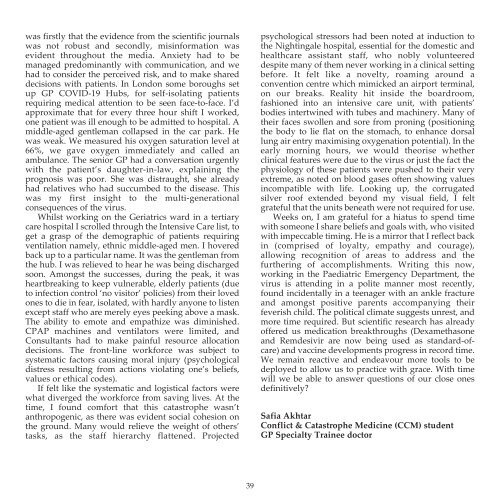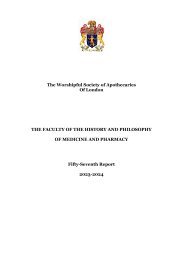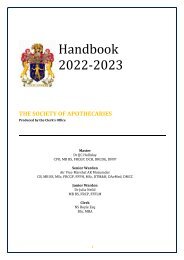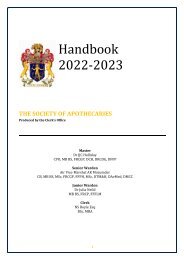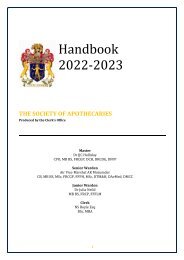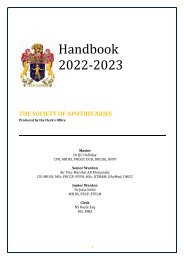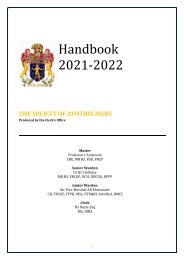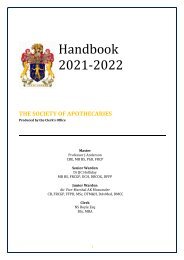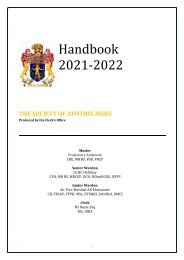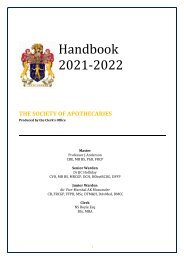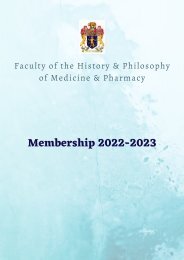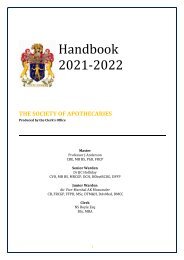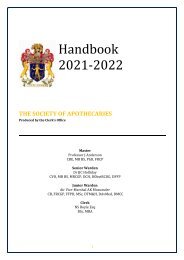Apothecary 2020
Journal of the Worshipful Society of Apothecaries for Master's Year 2019-20
Journal of the Worshipful Society of Apothecaries for Master's Year 2019-20
Create successful ePaper yourself
Turn your PDF publications into a flip-book with our unique Google optimized e-Paper software.
was firstly that the evidence from the scientific journals<br />
was not robust and secondly, misinformation was<br />
evident throughout the media. Anxiety had to be<br />
managed predominantly with communication, and we<br />
had to consider the perceived risk, and to make shared<br />
decisions with patients. In London some boroughs set<br />
up GP COVID-19 Hubs, for self-isolating patients<br />
requiring medical attention to be seen face-to-face. I’d<br />
approximate that for every three hour shift I worked,<br />
one patient was ill enough to be admitted to hospital. A<br />
middle-aged gentleman collapsed in the car park. He<br />
was weak. We measured his oxygen saturation level at<br />
66%, we gave oxygen immediately and called an<br />
ambulance. The senior GP had a conversation urgently<br />
with the patient’s daughter-in-law, explaining the<br />
prognosis was poor. She was distraught, she already<br />
had relatives who had succumbed to the disease. This<br />
was my first insight to the multi-generational<br />
consequences of the virus.<br />
Whilst working on the Geriatrics ward in a tertiary<br />
care hospital I scrolled through the Intensive Care list, to<br />
get a grasp of the demographic of patients requiring<br />
ventilation namely, ethnic middle-aged men. I hovered<br />
back up to a particular name. It was the gentleman from<br />
the hub. I was relieved to hear he was being discharged<br />
soon. Amongst the successes, during the peak, it was<br />
heartbreaking to keep vulnerable, elderly patients (due<br />
to infection control ‘no visitor’ policies) from their loved<br />
ones to die in fear, isolated, with hardly anyone to listen<br />
except staff who are merely eyes peeking above a mask.<br />
The ability to emote and empathize was diminished.<br />
CPAP machines and ventilators were limited, and<br />
Consultants had to make painful resource allocation<br />
decisions. The front-line workforce was subject to<br />
systematic factors causing moral injury (psychological<br />
distress resulting from actions violating one’s beliefs,<br />
values or ethical codes).<br />
If felt like the systematic and logistical factors were<br />
what diverged the workforce from saving lives. At the<br />
time, I found comfort that this catastrophe wasn’t<br />
anthropogenic, as there was evident social cohesion on<br />
the ground. Many would relieve the weight of others’<br />
tasks, as the staff hierarchy flattened. Projected<br />
psychological stressors had been noted at induction to<br />
the Nightingale hospital, essential for the domestic and<br />
healthcare assistant staff, who nobly volunteered<br />
despite many of them never working in a clinical setting<br />
before. It felt like a novelty, roaming around a<br />
convention centre which mimicked an airport terminal,<br />
on our breaks. Reality hit inside the boardroom,<br />
fashioned into an intensive care unit, with patients’<br />
bodies intertwined with tubes and machinery. Many of<br />
their faces swollen and sore from proning (positioning<br />
the body to lie flat on the stomach, to enhance dorsal<br />
lung air entry maximising oxygenation potential). In the<br />
early morning hours, we would theorise whether<br />
clinical features were due to the virus or just the fact the<br />
physiology of these patients were pushed to their very<br />
extreme, as noted on blood gases often showing values<br />
incompatible with life. Looking up, the corrugated<br />
silver roof extended beyond my visual field, I felt<br />
grateful that the units beneath were not required for use.<br />
Weeks on, I am grateful for a hiatus to spend time<br />
with someone I share beliefs and goals with, who visited<br />
with impeccable timing. He is a mirror that I reflect back<br />
in (comprised of loyalty, empathy and courage),<br />
allowing recognition of areas to address and the<br />
furthering of accomplishments. Writing this now,<br />
working in the Paediatric Emergency Department, the<br />
virus is attending in a polite manner most recently,<br />
found incidentally in a teenager with an ankle fracture<br />
and amongst positive parents accompanying their<br />
feverish child. The political climate suggests unrest, and<br />
more time required. But scientific research has already<br />
offered us medication breakthroughs (Dexamethasone<br />
and Remdesivir are now being used as standard-ofcare)<br />
and vaccine developments progress in record time.<br />
We remain reactive and endeavour more tools to be<br />
deployed to allow us to practice with grace. With time<br />
will we be able to answer questions of our close ones<br />
definitively?<br />
Safia Akhtar<br />
Conflict & Catastrophe Medicine (CCM) student<br />
GP Specialty Trainee doctor<br />
39


